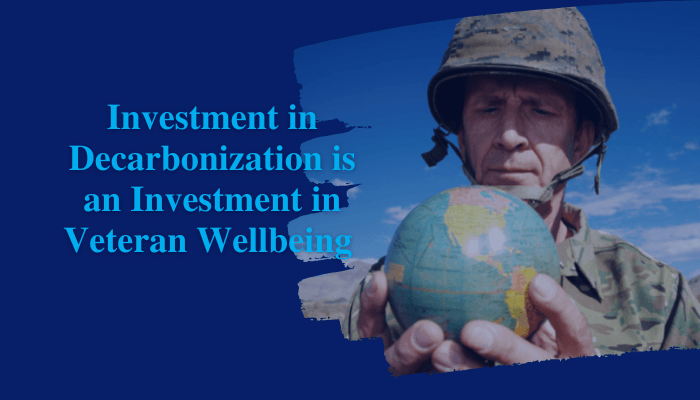How Climate Change Affects Veterans and How Investors Can Help

Climate change is wreaking havoc on our globe. Regardless of where we call home, we’re all witness to its effects. CNN reported the wildfires on the West Coast this July have contributed to the worst air quality New York has seen in 15 years.
According to the Department of Defense, this issue poses a monumental threat to our national security. In fact, the DOD asserted that
two-thirds of the military’s operationally critical installations are threatened by the effects of climate change, including floods, droughts and wildfires.
How does climate change affect veterans?
Many veterans have
voiced their concerns about climate change and its threat to national and global security and military infrastructure. As veterans,
we are uniquely affected by climate change’s consequences as many of us have undergone energy-related experiences during active service such as leading oil convoys or securing refueling platforms. We also face climate-related health risks.
The Department of Veterans Affairs
details how climate change impacts veterans’ health and healthcare. Climate change affects
public health through background health factors such as inferior air-quality and increased allergen load. Access to
emergency services is often compromised during natural disasters when resources and personnel are strained.
The veteran population is deeply diverse and represents all facets of our country, including those
groups who are most vulnerable to the effects of climate change, such as communities of color, older adults, the disabled, low-income families or individuals or those experiencing homelessness.
Veterans have often been exposed to
environmental health risks, such as contaminated water, hazardous chemicals, asbestos and carcinogens during active service, which can lead to long-term chronic illnesses as well.
In short,
climate change negatively affects veterans’ wellbeing.
The good news is that investors can steward change through climate-conscious action. Action that will ultimately contribute to veteran wellbeing by mitigating the health risks climate change poses.
Invest Responsibly with American Veterans Group
How can investors help?
It’s critical investors push corporate climate responsibility, including decarbonization efforts. Ambitious pledges to net zero emissions continue to increase, as leadership across the financial sector is charged with turning promises into action.
The
Investor Agenda has developed the
Investor Climate Action Plans (ICAPS) Expectations Ladder for investors of all levels to operationalize their climate targets and track their progress. The ladder outlines actions investors can take in governance, corporate engagement, policy advocacy, investor disclosure and investment strategy. In addition to providing a framework for climate action plans, the ladder also calls for lobbying alignment.
Real change will require a united, well-organized, and focused effort from investors. The ICAPs provides a pathway for that systematic and structured change. And while this energy transition is unprecedented and complex, success is non negotiable.
The climate crisis affects us all – as people, as veterans, as Americans. When we invest in climate responsibility, we invest in ourselves.


